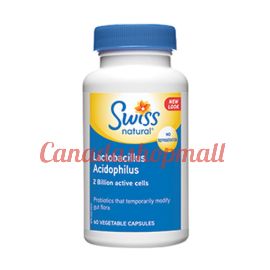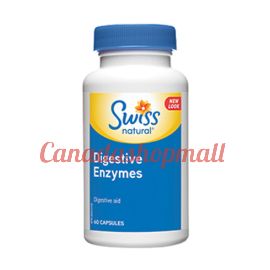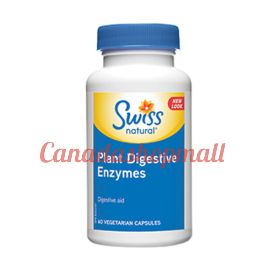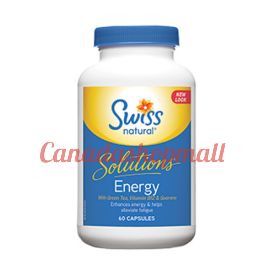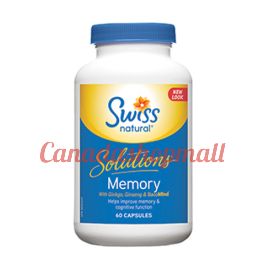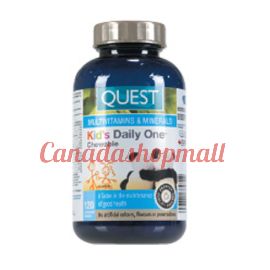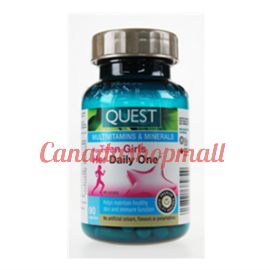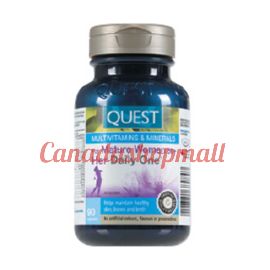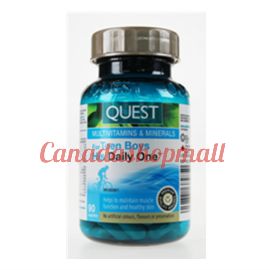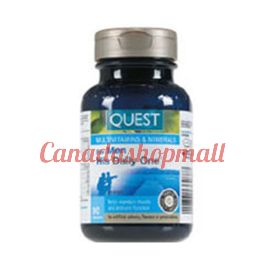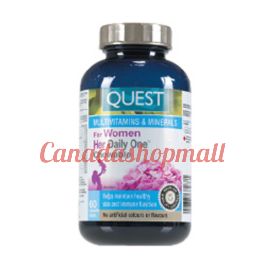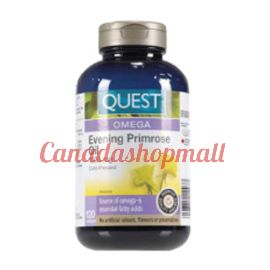We use cookies to make your experience better. To comply with the new e-Privacy directive, we need to ask for your consent to set the cookies. Learn more.
Quest Cal-Mag Complete 120tablets
$15.95
In stock
SKU
Quest Cal-Mag Complete 120tablets
Quest Cal-Mag Complete is a high-quality, synergistic formula containing calcium and magnesium in the ideal 1:1 ratio, plus vitamin C, vitamin D3, and zinc. Calcium and magnesium are vital components of bone and tooth metabolism, and both participate in energy production, muscle contraction, nerve function, and the maintenance of the acid-alkali balance of body fluids. Vitamin C is essential for the growth and repair of all tissues, and it is needed for the formation of collagen, bone, and cartilage. Vitamin D is essential for the absorption of calcium. Zinc has many functions in the body and is also found in high concentrations in bone.
HEALTH SOLUTIONS:
RECOMMENDED USE: Calcium intake, when combined with suffi cient Vitamin D, a healthy diet and regular exercise, may reduce the risk of developing osteoporosis.
DOSAGE FORM: Tablets
RECOMMENDATIONS: Adults take 1 tablet twice daily with a meal, or as directed by a health care practitioner.
DESCRIPTION: Each easy-to-swallow tablet of Quest Cal-Mag Complete contains 250 mg of calcium (citrate), 250 mg of magnesium (oxide), 150 mg of vitamin C (ascorbic acid), 100 IU of vitamin D3, and 10 mg of zinc (citrate). This product contains no artificial preservatives, colours, flavours, or corn, dairy, egg, gluten, shellfish, soy or sulfites.
Recommended Daily Allowance: Calcium: Dosage for each nutrient varies, depending on age.
Food Sources: Calcium: Dairy products, legumes, dark green leafy vegetables, wheat bran, sea vegetables, almonds, Brazil nuts, fi gs. Magnesium: Legumes, nuts and seeds, whole grains, green leafy vegetables, blackstrap molasses, wheat germ. Vitamin C: Fruits and vegetables, especially Brussels sprouts, collards, kale, parsley, tomatoes, sweet peppers, watercress, black currants, oranges, lemons, strawberries. Vitamin D: Sunlight is the best source; however, it is found in small amounts in fatty fi sh such as mackerel and salmon. Other sources are eggs from chickens fed vitamin D and milk that has been fortifi ed with vitamin D. Zinc: Oysters and other shellfi sh, fi sh, red meat, dark meat of poultry, whole grains, legumes, nuts and seeds
Causes of Defi ciency: Calcium: Abnormal parathyroid function, vitamin D deficiency, magnesium deficiency, alcoholism, low calcium diet, phosphates from carbonated beverages, excess caffeine, excess sodium. Magnesium: Diet of refined foods, excess calcium intake, alcoholism, surgery foods, diuretics, liver and kidney disease, some oral contraceptives. Vitamin C: Poor diet. Vitamin D: Inadequate sunshine, poor dietary choices, some medications. Zinc: Poor diet, excess fibre, excess phytic acid from diet high in legumes and whole grains, Crohn’s disease, malabsorption syndromes, alcoholism.
Symptoms of Defi ciency: Calcium: Rickets in children, osteomalacia osteoporosis in adults, muscle spasms, leg cramps. Magnesium: Fatigue, mental confusion, irritability, weakness, heart disturbances, problems in nerve conduction and muscle contraction, muscle cramps, loss of appetite, insomnia, predisposition to stress. Vitamin C: Bleeding gums, easy bruising, fragile bones, poor wound healing, susceptibility to infection, hysteria, depression. Vitamin D: Rickets in children, osteomalacia and osteoporosis inadults, joint pain. Zinc: Susceptibility to infection, slow wound healing, diminished appetite, impaired sense of taste and smell, impaired night vision.
Complementary Nutrients: Calcium: Magnesium, vitamin D, potassium, vitamin K. Magnesium: Calcium, phosphorus, vitamin B6. Vitamin C: Bioflavonoids, vitamin E, selenium, beta-carotene. Vitamin D: Calcium. Zinc: A healthful diet.
HOW IT WORKS:
Calcium: This mineral is well known for its essential role in the formation of bones and tooth enamel; however, it also performs many other functions. Calcium is involved in fat and protein digestion and the production of energy. It is involved in blood clotting and the transmission of nerve impulses, and it regulates the contraction and relaxation of muscles, including the heart. In addition, calcium may reduce the risk of colon cancer and suppress the growth of polyps that can lead to cancer. Magnesium: Besides its role in maintaining healthy bones by promoting the absorption of calcium, magnesium is involved in maintaining a healthy nervous system. In addition, magnesium is required for muscle relaxation, energy production, protein formation, cellular replication, the regulation of sodium and potassium in the cells, and effi cient heart function. Vitamin C: In addition to its role as an antioxidant and immune-enhancing nutrient, this vitamin is essential in the maintenance of healthy bones. Vitamin D: This vitamin regulates calcium metabolism. Without vitamin D, the body cannot properly absorb calcium, and the bones and teeth become soft and poorly mineralized. Zinc: Functions as a cofactor in over 20 enzymatic reactions, and it plays a role in insulin activity, protein and DNA synthesis, taste and smell, wound healing, the maintenance of normal vitamin A levels, bone structure, and the immune system.
RESEARCH:
Calcium, magnesium, and vitamin D supplementation for bone health is supported by extensive scientific research. Countless studies conclude that a combination of calcium, magnesium, and vitamin D is required for bone health and the prevention of osteoporosis. Extensive research shows that vitamin C is essential to the production of collagen, the substance that holds all body structures together. Some health care practitioners prescribe supplemental zinc to stimulate the wound healing process, including the repair of broken bones.
SIDE EFFECTS: No known side effects at recommended dosage.
INTERACTIONS AND SAFETY CONSIDERATIONS: Consult a health care practitioner before use if you have a serious illness or are on any medications.
OTHER CONSIDERATIONS: Consult a health care practitioner before use if you are pregnant or breastfeeding. Keep out of reach of children.
Write Your Own Review
Related Products
Recommended For You
Check items to add to the cart or





